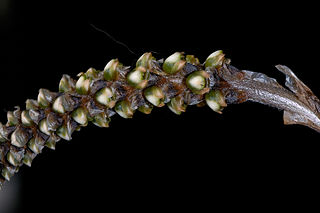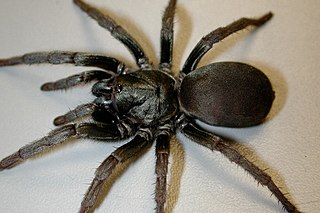
Aa is a genus of plants of the family Orchidaceae.

Baron Nöel Frédéric Armand André de Lafresnaye was a French ornithologist and collector.

Alexander Pollock Moore was an American diplomat, editor and publisher. Born in Pittsburgh on November 10, 1867, he was the publisher/owner of the Pittsburgh Leader when he married the stage actress Lillian Russell, becoming her fourth husband. He was a delegate to the Republican National Convention from Pennsylvania in 1916.

The bronze-winged duck also known as the spectacled duck, is a dabbling duck and the sole member of its genus Speculanas. It is often placed in Anas with most other dabbling ducks, but its closest relative is either the crested duck or the Brazilian duck, which likewise form monotypic genera. Together they belong to a South American lineage which diverged early from the other dabbling ducks and may include the steamer ducks.
The Picunche, also referred to as picones by the Spanish, were a Mapudungun-speaking Chilean people living to the north of the Mapuches or Araucanians and south of the Choapa River and the Diaguitas. Until the Conquest of Chile the Itata was the natural limit between the Mapuche, located to the south, and Picunche, to the north. During the Inca attempt to conquer Chile the southern Picunche peoples that successfully resisted them were later known as the Promaucaes.

Nothofagus pumilio, the lenga beech, is a deciduous tree or shrub in the Nothofagaceae family that is native to the southern Andes range, in the temperate forests of Chile and Argentina to Tierra del Fuego, from 35° to 56° South latitude. This tree is in the same genus as the coihue. It regenerates easily after fires. The wood is of good quality, moderate durability, and is easy to work with. It is used in furniture, shingles and construction and sometimes as a substitute for American black cherry in the manufacturing of cabinets.
Oedematopus is a genus of fly in family Dolichopodidae.

Estadio Santa Laura is a football stadium in Independencia, Santiago, Chile. It is the home stadium of Unión Española. The stadium holds 19,000 people and was built in 1922. It is a multi-use stadium, also used for concerts.

Nemesiidae, also known as funnel-web trapdoor spiders, is a family of mygalomorph spiders first described by Eugène Simon in 1889, and raised to family status in 1985. Before becoming its own family, it was considered part of "Dipluridae".

Escalloniaceae is a family of flowering plants consisting of about 130 species in seven genera. In the APG II system it is one of eight families in the euasterids II clade (campanulids) that are unplaced as to order. More recent research has provided evidence that two of those families, Eremosynaceae and Tribelaceae, arose from within Escalloniaceae; the Angiosperm Phylogeny Website therefore merges these two families into Escalloniaceae, and also places the family alone in order Escalloniales.

Gevuina avellana is an evergreen tree, up to 20 meters tall. It is the only species currently classified in the genus Gevuina. It is native to southern Chile and adjacent valleys in Argentina. It is found from sea level to 700 meters above sea level. Its distribution extends from 35° to 44° south latitude. The composite leaves are bright green and toothed, and the tree is in flower between July and November. The flowers are very small and beige to whitish, are bisexual and group two by two in long racemes. The fruit is a dark red nut when young and turns black. The peel is woody. It can grow up straight or branched from the soil, making up either a tree or a shrub.

Braden Copper Company was an American company that controlled the El Teniente copper mine in Chile until 1967 when its copper holdings were nationalized.

Argopecten is a genus of saltwater clams, or scallops, marine bivalve mollusks in the family Pectinidae.
Bobbichthys is an extinct genus of ray-finned fish that lived in what is now Chile during the Oxfordian stage of the Late Jurassic epoch.

Varasichthys is an extinct genus of prehistoric bony fish that lived during the Oxfordian stage of the Late Jurassic epoch. Fossils have been found in the Domeyko Range of Antofagasta Region, northern Chile. The genus has been compared with other South American fishes as Luisiella and Protoclupea.
Protoclupea is an extinct genus of prehistoric bony fish that lived from the Oxfordian to the early Tithonian stage of the Late Jurassic epoch. Fossils have been found in the Domeyko Range of Antofagasta Region, northern Chile. The genus has been compared with other South American fishes as Luisiella and Varasichthys.

Erich Karl Heinrich Kettelhut was a German production designer, art director and set decorator. Kettelhut is considered as one of the most important artists in the history of early German cinema, mainly for his set direction for Die Nibelungen (1924) and his design and visual effects for Metropolis (1927). His early career was defined by a working relationship with fellow designers Otto Hunte and Karl Vollbrecht, the trio working on many of Fritz Lang's early German films. Despite being best known for his iconic visuals on several of the most important films of German Expressionist cinema, he is also noted for a career spanning into the 1960s and his work on more light-hearted films and musicals.

Piscophoca is an extinct genus of pinniped. The genus was named after the fossiliferous Pisco Formation in Peru, where the holotype was found. Other fossils of the genus were found in the Bahía Inglesa Formation of the Caldera Basin in Chile.

Carousel is a 1937 German musical film directed by Alwin Elling and starring Marika Rökk, Georg Alexander, and Paul Henckels.

†Zygopleura is an extinct genus of fossil sea snails, marine gastropod molluscs in the family Zygopleuridae.















